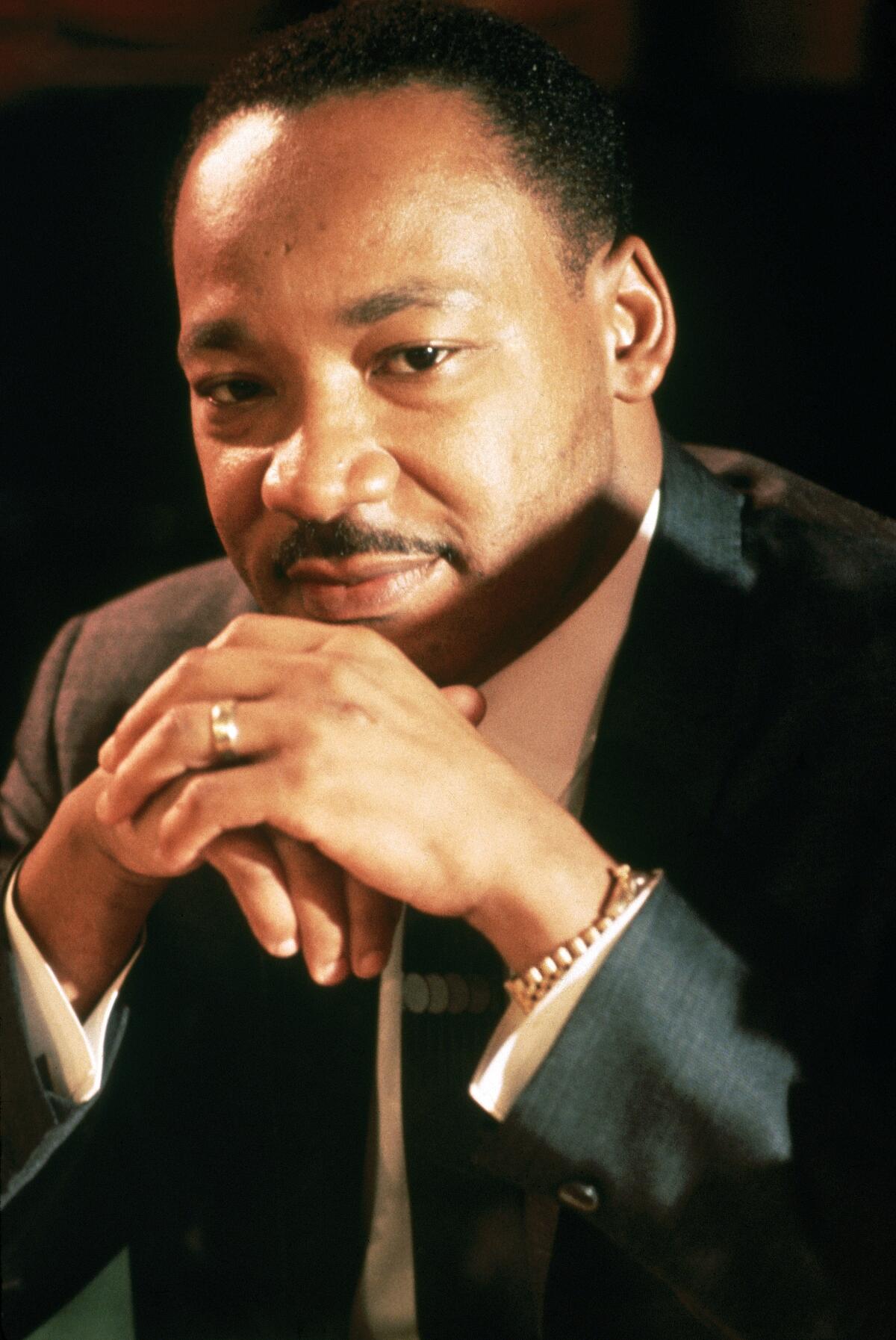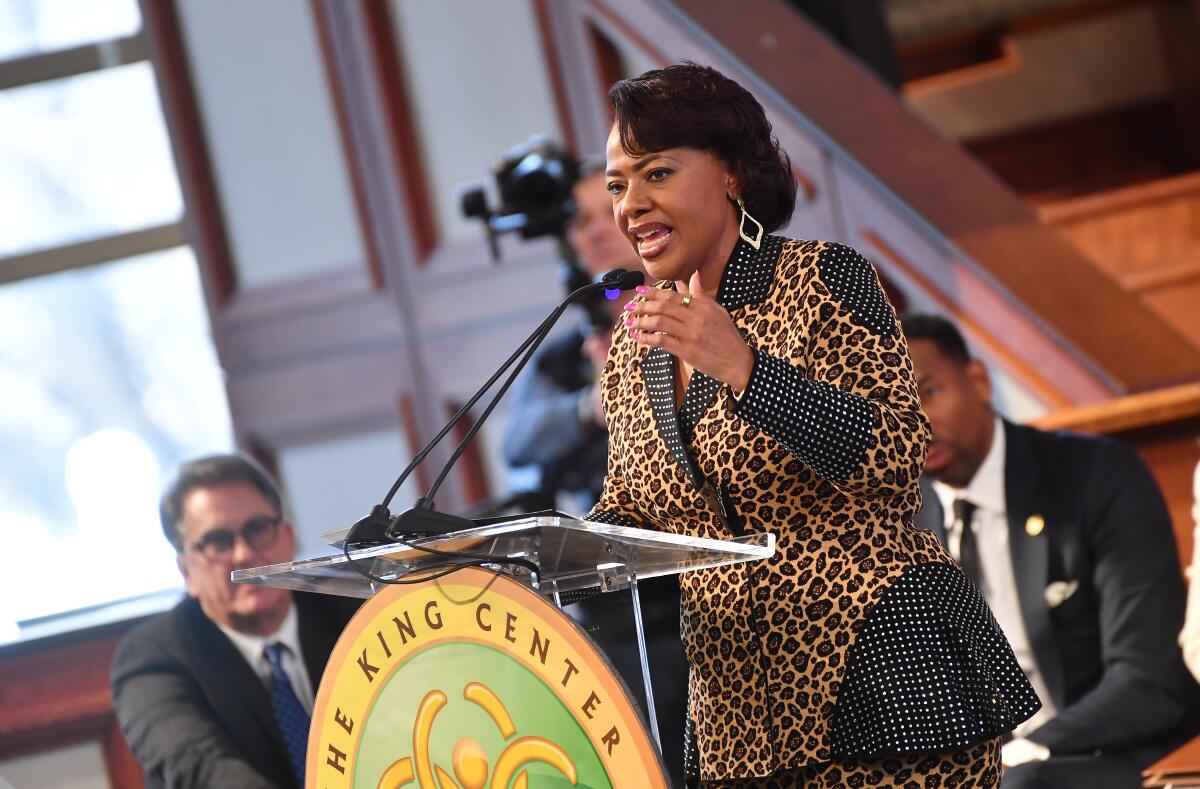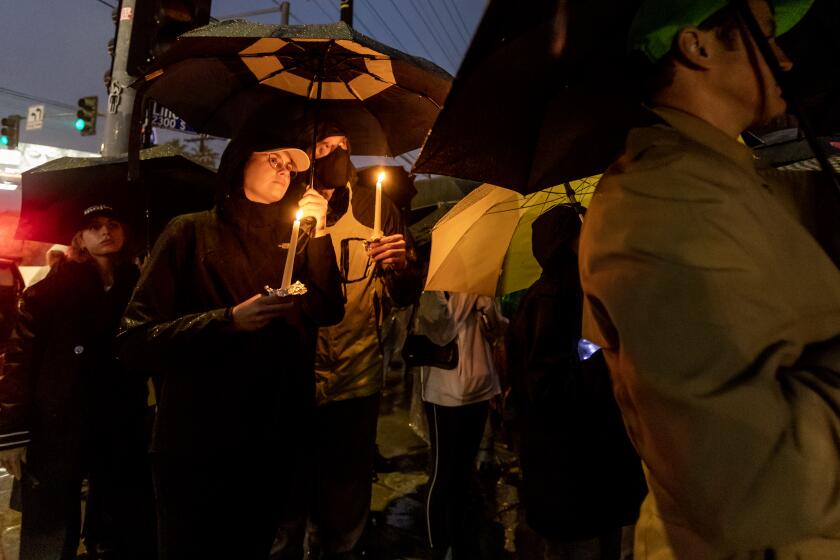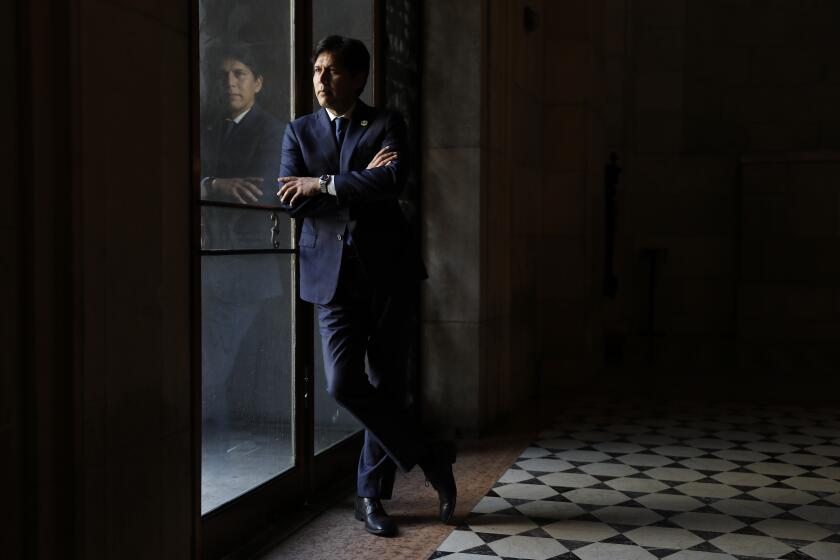Martin Luther King Day should make you uncomfortable

- Share via
To become beloved, too often Black folks first have to die. And too often, even that isn’t enough.
At this time of year, I wonder how America would celebrate one man in particular today had he lived. The Rev. Martin Luther King Jr. would have turned 94 last Sunday had an assassin’s bullet not taken his life in Memphis, Tenn., and I cannot help but think how many people would still be denigrating him were he alive today.
It doesn’t take much conjecture to visualize this. I still remember the fierce opposition to the very idea of an MLK Day, including from the man who eventually made it official. President Reagan had been an opponent of an official King holiday before eventually signing it into law in 1983. And though many regard King as a kind of American saint, only 55% of respondents to a poll taken this month said that King’s birthday should be a federal holiday. Only 39% of Republicans said yes, with nearly as many of them saying they were against it.
Honoring someone with a holiday has never ensured that people will like them. After all, we still have a Columbus Day. However, in King’s case, his posthumous popularity has turned his holiday into a celebration of things he wasn’t, by people intent on reshaping his legacy to their own liking.
Keenan Anderson, cousin of a BLM founder, is among three men of color who have died this year after encounters with LAPD officers. A vigil was packed.
This is why the King holiday, typically a day of rest for many, now primarily makes me tired. I mean that with respect, and in one specific respect.
Like clockwork, innumerable journalists and scholars feel an obligation not merely to celebrate King, but also to remind everyone who King actually was. Every year, we see articles that tell you how to properly cook your Thanksgiving turkey or find the right Christmas tree. The MLK Day version of that is “stop appropriating a man’s legacy for your own agendas.” I’ve written my share.
Elected officials and talking heads, primarily on the political right, keep trying to conscript a revolutionary whose murder resulted from the very racism they propagate. Countering this is necessary, but exhausting. It recalls what the late Toni Morrison so wisely said: “The very serious function of racism is distraction.” However, it’s also taxing to listen to and see the folks who like to post the MLK quotes this week and keep living their incurious lives the next.
King was anti-capitalist, anti-poverty, anti-imperialist, anti-oligarchy. But we keep hearing a few select quotes cited by people with agendas counter to his. “I have a dream that my four little children will one day live in a nation where they will not be judged by the color of their skin but by the content of their character” does not mean that we shouldn’t reckon with the racism in America’s past and present. That’s essentially what Republicans like Marsha Blackburn have claimed.
Shortly after introducing a resolution in 2021 “condemning critical race theory in K-12 schools” — where it is hardly taught, but arguably should be — the senior U.S. senator from Tennessee argued that what she mislabels as CRT is “encouraging our children to be ashamed of the color of their skin.” Considering my experiences with racism in scholastic environments, I see that word “our” doing a lot of work.
Blackburn still wants to forbid what is essentially any teaching and learning about America’s actual history. Her website features an “action plan” to accomplish this, but didn’t stop her from tweeting this on Monday morning:
“Today, we remember a man committed to the vision that people should be judged by the content of their character and not the color of their skin.”
The Rev. Bernice King, Martin’s youngest daughter and the chief executive of the King Center for Nonviolent Social Change, checked Blackburn later that day, writing, “My father’s ‘vision’ was that we eradicate racism, militarism & poverty. Deconstructing systems that deny equity in access, safety & opportunity does not = judging white people for being white.”
For the record:
8:58 a.m. Jan. 19, 2023An earlier version of this essay incorrectly said the author spoke at an event at Ebenezer Baptist Church two years ago. It happened three years ago.
Bernice King helped me spend her father’s birthday productively three years ago when she invited me to share a stage with an assortment of speakers and deliver remarks at her father’s church, Ebenezer Baptist in Atlanta (where Sen. Raphael Warnock remains the pastor). At this year’s edition of the same assembly, prior to her response to Blackburn, she lamented on Monday the “comfortable and convenient” reshaping of Martin’s legacy. “A prophetic word calls for an inconvenience because it challenges us to change our hearts, our minds and our behavior,” she said. “Dr. King, the inconvenient King, puts some demands on us to change our ways.”
In that vein, I’ve realized that when I celebrate King’s holiday, I shouldn’t merely focus upon the ignorance of others. I have to worry first about my own. Thanks to our changing world, there is always much to learn even by revisiting what I’ve already read and seen already. Both Martin and his daughter have been bulwarks against a rising tide of benightedness, so personal education and edification have felt like a fitting tribute.
I do this because I, too, received an insufficient education concerning the civil rights movement and King’s life. It has been nearly 40 years since I last saw my seventh-grade U.S. history book, a thick volume with a giant bald eagle on the front cover, but I may never forget one page in particular. It was the only one that I recall mentioning the Civil Rights Movement.
To my recollection, the page only reserved a little less than one of its two columns and only mentioned one movement leader: Martin Luther King Jr. The late reverend is one of the most important human beings that ever lived, but he could not encapsulate decades fighting for Black dignity, equity, and survival.
You only needed one hand and another thumb to count all the Black schoolchildren in my private school’s grade, and depending upon the class, I was at times the only one in the room. And this was the book that was going to help us learn about America? Even at 12 years old, I could recognize how ludicrous that was.

That’s largely because I had parents and other family members who took an active role in supplementing my education about my people. At home, at church and in my community, I received an education in Black history that my schools were either unable or unwilling to provide. I doubt my classmates could say the same, no matter their color. And while the dangers of bigotry forced me and my fellow students of color to learn how to navigate around and amongst whiteness from the time we could walk, were our white classmates pressured to become similarly fluent in our cultures and our experiences? I have a healthy skepticism about that, as well.
Since audio leaked of a racist conversation between Kevin de León and fellow L.A. City Council members, he has said he must stay in office to help the city heal. But by tending to his own wounds, he keeps ours from closing.
Whatever learning Americans are doing about Black life remains largely remedial. Our struggle for civil rights back in 2020 after the deaths of George Floyd, Breanna Taylor and Ahmaud Arbery hasn’t held the news cycle, and legislators have responded with a flood of bills that would suppress protest and dissent. I’m not just talking about the unearthing of Confederate statues and monuments, though who is talking much about that anymore? Even after the Jan. 6 seditionists mounted an ipso facto response, the momentum toward Black equity has slowed considerably. Additionally, the continued white dominance in storytelling industries (including both Hollywood and journalism), nonwhite, nonmale and nonhetero experiences in the mainstream remain largely relegated to being “niche.” America fails, still, to embrace the common humanity that we share and which King sought to underscore. That was at the forefront of my mind because on Monday, I revisited King’s final book, written the year before his assassination. “Where Do We Go From Here: Chaos or Community? “ feels timely even 56 years later, given the increasing conspicuousness both of bigotry in America and the violence it animates.
Only a few pages in, you’ll find this passage:
“Whites, it must frankly be said, are not putting in a similar mass effort to reeducate themselves out of their racial ignorance. It is an aspect of their sense of superiority that the white people of America believe they have so little to learn. The reality of substantial investment to assist Negroes into the twentieth century, adjusting to Negro neighbors and genuine school integration, is still a nightmare for all too many white Americans.”
I hope everyone reading this takes that to heart, because it isn’t just white people who have been poorly educated about Black folks. We all have. Bigotries emerge not merely out of ignorance, but from an accompanying lack of curiosity and courage. Nothing nurtures that ignorance and cowardice quite like comfort.
More to Read
Sign up for Essential California
The most important California stories and recommendations in your inbox every morning.
You may occasionally receive promotional content from the Los Angeles Times.
















